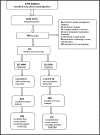Can phone-based motivational interviewing improve medication adherence to antiplatelet medications after a coronary stent among racial minorities? A randomized trial
- PMID: 25500787
- PMCID: PMC4370989
- DOI: 10.1007/s11606-014-3139-8
Can phone-based motivational interviewing improve medication adherence to antiplatelet medications after a coronary stent among racial minorities? A randomized trial
Abstract
Background: Minorities have lower adherence to cardiovascular medications and have worst cardiovascular outcomes post coronary stent placement
Objective: The aim of this study is to compare the efficacy of phone-delivered Motivational Interviewing (MINT) to an educational video at improving adherence to antiplatelet medications among insured minorities.
Design: This was a randomized study.
Participants: We identified minorities with a recently placed coronary stent from an administrative data set by using a previously validated algorithm.
Interventions: MINT subjects received quarterly phone calls and the DVD group received a one-time mailed video.
Main measures: Outcome variables were collected at baseline and at 12-month post-stent, using surveys and administrative data. The primary outcome was antiplatelet (clopidogrel and prasugrel) adherence measured by Medication Possession Ratio (MPR) and self- reported adherence (Morisky score). We also measured appropriate adherence defined as an MPR ≥ 0.80.
Key results: We recruited 452 minority subjects with a new coronary stent (44 % Hispanics and 56 % Black). The patients had a mean age of 69.5 ± 8.8, 58 % were males, 78 % had an income lower than $30,000 per year and only 22 % had achieved high school education or higher. The MPR for antiplatelet medications was 0.77 for the MINT group compared to 0.70 for the DVD group (p < 0.05). The percentage of subjects with adequate adherence to their antiplatelet medication was 64 % in the MINT group and 50 % in the DVD group (p < 0.01). Self-reported adherence at 12 months was higher in the MINT group compared to the DVD group (p < 0.01). Results were similar among drug-eluting stent (DES) recipients.
Conclusions: Among racial minorities, a phone-based motivational interview is effective at improving adherence to antiplatelet medications post coronary stent placement. Phone-based MINT seems to be a promising and cost-effective strategy to modify risk behaviors among minority populations at high cardiovascular risk.
References
-
- Grines C. Prevention of premature discontinuation of dual antiplatelet therapy in patients with coronary artery stents: a science advisory from the American Heart Association, American College of Cardiology, Society for Cardiovascular Angiography and Interventions, American College of Surgeons, and American Dental Association, with representation from the American College of Physicians. Circulation (New York, N.Y.). 2007;115(6):813–8. - PubMed
-
- Spertus JA, Kettelkamp R, Vance C, et al. Prevalence, predictors, and outcomes of premature discontinuation of thienopyridine therapy after drug-eluting stent placement: results from the PREMIER registry. Circulation. 2006;113(24):2803–9. - PubMed
-
- Petersen JL, Barron JJ, Hammill BG, et al. Clopidogrel use and clinical events after drug-eluting stent implantation: findings from the HealthCore integrated research database. Am Heart J. 2010;159(3):462–470.e1. - PubMed
Publication types
MeSH terms
Substances
Grants and funding
LinkOut - more resources
Full Text Sources
Other Literature Sources
Medical


